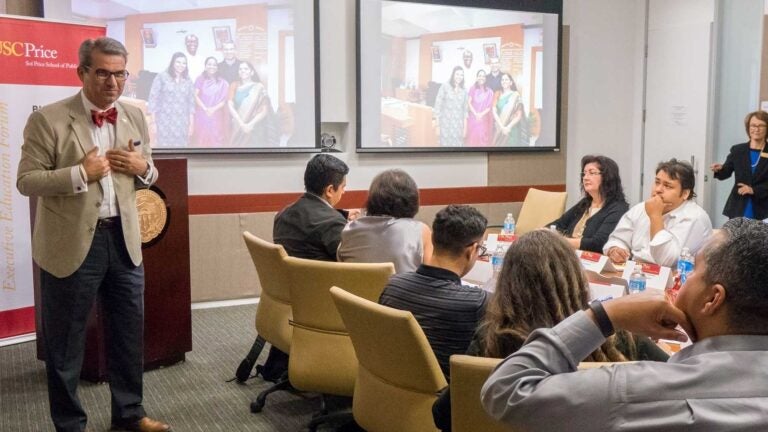
Professor Frank Zerunyan, left, gives a lecture on the difference between leadership and management. (Photo/Deirdre Flanagan)
USC professor spotlights the significance of Latinos to California’s future
Public officials from the League of California Cities Latino Caucus take part in an executive education forum
The USC Price School of Public Policy has taken a leading role in training local decision-makers and its partnership with the Latino Caucus demonstrates the inroads it has made.
That’s a thought from USC Price Professor Raphael Bostic.
USC Price hosted more than 20 public officials from the League of California Cities Latino Caucus, who took part in the Bedrosian Center on Governance’s Local Leaders Executive Education Forum on Sept. 22 and 23.
The participants, many of whom are mayors or council members of cities across California, heard presentations from USC Price faculty on leadership, public ethics and housing policy, among other topics.
Professor Frank Zerunyan, director of executive education at the Bedrosian Center, led the program, which was the product of an agreement that USC Price and the Bedrosian Center signed with the Latino Caucus in 2014 to provide training aimed at enhancing the leadership capacity of public officials statewide.
This is an important expansion of what has already proven to be a successful program.
Raphael Bostic
“This is an important expansion of what has already proven to be a successful program,” said Bostic, who holds the Bedrosian Chair in Governance and the Public Enterprise.
Zerunyan, who also serves as mayor pro tem of the city of Rolling Hills Estates, pointed out the significance of Latinos to California’s future, as the state is projected to shift toward a Latino majority by around 2030.
“We as an educational institution have an obligation to go out, recruit, seek and train the next generation of Latino leaders,” Zerunyan said. “When they succeed, we all succeed in California.”
Lifelong leadership lessons
Dennis Arriola, chairman and CEO of SoCal Gas Co., and Veronica Gutierrez, vice president of local public affairs for SoCal Edison, provided lessons in Latino leadership from the private sector.
Arriola — who heads the nation’s largest natural-gas distribution company, with 8,000 employees serving 21 million Californians — explained what he felt it took to be a good leader. Among the lessons he shared: allow yourself to be vulnerable by trusting others, explain your vision with storytelling, become a better listener, never stop learning and don’t be afraid to ask for help.
“I wish I would have had this type of opportunity when I was starting off in my corporate career, because it was a very different time,” Arriola said. “There weren’t a lot of people that looked like us, that had the types of last names we have. Whether you like it or not, you are now role models. So with the opportunity to be a leader also comes responsibility.”
Meeting the needs of the community
USC Price Professor Terry Cooper spoke to the group about public ethics; Bostic examined housing policy in the wake of the housing crisis and California’s loss of redevelopment in Latino communities; and Professor Antonio Bento discussed his research and modeling on the environment as a community engagement focus.
“My time with the class was both illuminating and enjoyable, as we wrestled with the many challenges that California’s cities face where housing is concerned,” Bostic noted. “I was impressed with the talent of the leaders and their hunger for information and learning. It bodes well for where our cities will go in the future.”
The topics of discussion resonated strongly with the public servants in attendance.
“My city of Vista is almost 100,000 people, and more than half of the population is Latino,” said Vista Deputy Mayor Amanda Rigby, who doesn’t identify as Latino but is a member of the Latino Caucus to best serve her community. “This was a good discussion to help me learn to be more supportive of the community, do more to help the community and understand some of the issues they might be having.”
In addition, Zerunyan gave a lecture on the difference between leadership and management. He emphasized that the USC educators were not there to tell the officials what to do, but rather to provoke their own thoughts and abilities to find solutions for themselves as leaders of their communities.
“The difference between management and leadership is something I grapple with as an elected official,” said Tony Barrera, council member for the city of Salinas. “I have to learn to trust management to get the work done, but at the same time it’s my responsibility to keep the constituents informed of the process.”
Zerunyan added, “We’re doing our job to train and educate leaders so they can go back to their communities and raise them up; advancing their communities and society as a whole is our mission as a school.”
